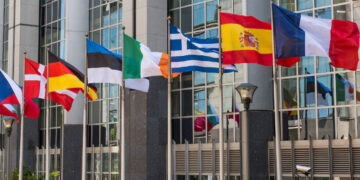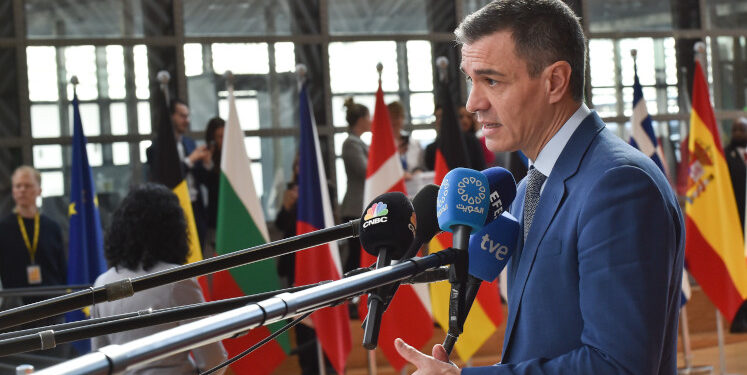Spanish Prime Minister Pedro Sánchez has committed to pursuing democratic regeneration in Spain. Yet as Fernando Casal Bértoa and José Javier Olivas Osuna argue, international indicators point to declining democratic standards since Sánchez came to power in 2018.
Earlier this year, a report by Spain’s Guardia Civil police force revealing abundant evidence of an alleged network of political corruption potentially led by PSOE’s organisational secretary triggered the biggest political crisis in Spain since Pedro Sánchez came to power in June 2018.
The Prime Minister has appeared several times since then, attempting to downplay the fact that so many people in his immediate circle, including his brother, wife, former vice-president and several top public officials and managers in public companies, are being investigated for corruption offences. In these interventions, in addition to presenting himself as the victim of a deception, Sánchez repeatedly reiterated his commitment to “democratic regeneration” and “the fight against corruption”.
Sánchez expressed “pride” in his government’s democratic progress, specifically for having “toughened the legislation”, “increased the levels of transparency and accountability”, and “improved Spain’s position in the international ranking of perception and fight against corruption”. However, the government’s optimism contrasts with constant complaints from opposition parties and civil society actors who have denounced a widespread process of institutional erosion at various levels.
Democratic regeneration or degeneration?
To discern whether Sánchez is right in boasting about Spanish democratic regeneration, it is necessary to analyse some of the international indicators on the quality of democracy.
The first step is to evaluate electoral competition in Spain. In addition to free and fair elections – which despite some recommendations from the OSCE/ODIHR to increase transparency and integrity, are so far unquestionable in Spain – democracies require, among many other elements, healthy rule of law. This means judges are independent, the media is free to criticise the government and corruption is under control.
Unfortunately, in these key democratic quality dimensions Spain displays a worrying trajectory, far from what Sánchez repeatedly advertises. The World Bank’s “rule of law” index, which measures adherence to universal rule of law principles in a country, shows a decline from 0.98 in 2018 to 0.82 in 2023. Even more dramatic is the decline in the World Bank’s “government effectiveness” index, where Spain has dropped from 0.97 in 2018 to 0.75 in 2023.
Declining democratic scores
The prestigious international V-Dem (Varieties of Democracy) project, which publishes annual measures of the level of democracy worldwide, still considers Spain a full democracy. However, it contradicts any claim that democratic regeneration has occurred during Sánchez’s term in office.
Government attacks on the judiciary have increased significantly in recent years. V-Dem’s index for measuring this, where a score of 4 indicates no attacks, has decreased from 3.57 in 2018 to 2.83 in 2024. No wonder that in the latest Eurobarometer, 42% of Spanish citizens considered that judicial independence in the country is bad (only Hungary, Greece, Slovakia, Bulgaria, Croatia and Poland performed worse).
Figure 1: Democracy scores in Spain (2018–24)
Note: Compiled by the authors using data from the V-Dem (Varieties of Democracy) project.
Many government actions may have contributed to this deterioration. For example, there was a 2021 decree annulling the power of the judiciary to renew judicial positions. In 2023, there was an attempt to appoint members of the General Council of the Judiciary (CGPJ) without the need for a reinforced majority. In 2024, the government tried to wrest the appointment of judges to the Supreme Court and High Courts from the CGPJ. And just this year, there was a controversial proposal to reform access to judicial and prosecutorial careers, and a proposed reform of the Statute of the Public Prosecutor’s Office and the Organic Law of Criminal Procedure.
Spain’s score on the V-Dem “executive respects constitution” index has also dropped from 3.7 in 2018 to 3.0 in 2024. The Amnesty Law for crimes related to the Catalonian independence attempt has been put into question by the Venice Commission and the European Commission’s legal services, as well as multiple legal and civil society associations for potential violations of the principles of equality, the separation of powers and the rule of law.
Most experts consider it to be a “self-amnesty” drafted precisely by those who will enjoy the erasure of such crimes as the misuse of public funds, disobedience and aggravated public disorder. The abuse of decrees to legislate while also evading parliamentary control has also been characteristic of this period, as has the failure to comply with the obligation to present annual budgets.
V-Dem’s indicators on freedom of expression have also worsened, from 0.92 in 2018 to 0.89 in 2024 (1 = maximum freedom of expression) and on media censorship, from 3.5 to 3 (4 = total absence of censorship). Furthermore, various legislative initiatives have been developed to control the governance and funding of media.
The expansion and selection of members of the RTVE Board of Directors with a political profile has been highly controversial, to the point of being criticised for not complying with European law by Reporters Without Borders. Journalists have denounced editorial pressure and a lack of pluralism within the public entity. The distribution of institutional advertising among private media outlets has also sparked controversy, perceived as a means to exert pressure, buy loyalty and silence criticism.
Political corruption
V-Dem indices of political corruption, executive corruption and clientelism show increases of 178%, 540% and 80%, respectively, from 2018 to 2024. This is also consistent with the results of Transparency International’s corruption perception index, which gave Spain its worst score (56 points) since 2001 in 2024 (63 points being the series average), placing Spain 46th out of 180 countries – a drop of 10 places in just the last year.
The investigations of corruption scandals have uncovered the existence of a network of irregular contracting and placement in the administration as well as in public companies. The pardons granted to pro-independence leaders and the reduction of sentences for embezzlement, as well as the growing lack of government transparency in many fields – including the numerous governance pacts with pro-independence parties whose specific agreements remain secret – have contributed to the feeling of a lack of accountability and defencelessness.
Spain has received a very poor score in the “Right to Information Rating” (73 out of 150 points), falling from 86th in 2018 to 96th in 2024 among 140 countries. It also received a failing grade in the International Budget Transparency Index, where it ranks below most OECD countries.
V-Dem lowered Spain’s rating as a liberal democracy from 0.78 in 2018 to 0.75 in 2024, placing it in its latest report among the 20 countries at risk of autocratisation. If we add to this Spain’s very high levels of political polarisation, which are unprecedented since the end of the democratic transition, with an increase of 36% between 2018 and 2024 according to V-Dem data, it is not surprising that several political experts have started to raise the alarm.
In summary, Sánchez’s promises to end corruption and increase the quality of democracy in Spain have not been fulfilled. On the contrary, we are seeing precisely those areas where the government has failed or been unable to meet its objectives repeatedly presented as successes. If we look at most international indices of democratic quality, Spain has not experienced a period of regeneration, but rather one of democratic degeneration.
A shorter version of this article was first published in the Spanish newspaper El Mundo.
Note: This article gives the views of the authors, not the position of EUROPP – European Politics and Policy or the London School of Economics. Featured image credit: European Union







































Discussion about this post